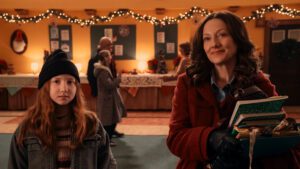About Business
Barbara Robinson’s 1972 book about the “worst children in the world” taking all the lead roles in a church Christmas pageant has been lovingly adapted by director Dallas Jenkins into a warm-hearted film that glows with the message of hope and kindness. Jenkins, the author of the Jesus-centered crowdfunded series "The Chosen," claims that this project has been his dream for twenty years. Like the book and the 1983 made-for-TV version starring Loretta Swit and a young Fairuza Balk, the story is narrated with a nostalgic tone by the adult Beth (Lauren Graham). She provides the following explanation: "The Herdmans were absolutely the worst children in the history of the world." They lied, they stole, they smoked cigars. Even though the children were larger than they were, they struck the little ones. They took the Lord’s name in vain. They made fun of teachers. They even set fire to the tool shed.” We see young Beth (soulful-eyed Molly Belle Wright) sadly allow Imogen Herdman (Beatrice Schneider), to steal her necklace.
One Christmas, Beth’s mother, aptly named Grace (Judy Greer), agrees to take over the pageant, the biggest event of the year for the church and the small community.
Beth’s brother Charlie (Sebastian Billingsley-Rodriguez), angry that the Herdmans keep stealing his dessert at school, tells them an exaggerated story about the treats at church. And so, the Herdmans show up just as Grace is casting the pageant. They do not know anything about the story of the Nativity. The oldest of the Herdmans, Imogene, who acts as ringleader of the gang, watches movies and is captivated by the idea of acting, of “becoming someone new.” Plus, they are bullies, and it makes them feel powerful to take something wanted by someone else. They insist on being cast, Imogene as Mary, one brother as Joseph, her younger three brothers as the wise men, and their youngest sister, Gladys (Kynlee Heiman) a scruffy hellion missing her top two front teeth, as the angel who calls to the shepherds. or, as in her situation, screams at them. Grace is under a lot of pressure from the women who like to run things and feel superior. They want to see the pageant exactly as it has always been, including casting one snobbish mom’s daughter as Mary for the third time. These women see the Herdman children as unworthy—incorrigible hooligans, dirty, angry, and, even for the adults, scary.
Beth’s father Bob (a quietly genial Pete Holmes) takes the family to help give holiday meals to needy families, and Grace, Beth and Charlie learn that the Herdman children are all but feral, with no father and a mother who works all the time. Grace decides to give them a chance to be part of something.
The film is beautifully designed by Jean-Andre Carriere and takes place in an idealized, undetermined past that reflects Beth's childhood memories. But it is a bit jarring to see otherwise-supportive Bob annoyed at having to eat a foil-wrapped TV dinner on a stack table, a scene out of a ’50s sitcom. Although the pageant was a success (hey, that's not a spoiler; check out the title), audiences who had already developed a connection with the Herdmans may want additional assurance that the community's awareness of their circumstance resulted in more support over the long term. It is not enough to have an end-credit update showing that almost all of them had productive and happy adult lives.
But the film endears itself by carrying its religious messages lightly, with humor, warmth, generosity. Grace tells Beth that it is truer to the message of Jesus to welcome those who are not welcome anywhere else than to present a pristine pageant exactly as it was every year before, despite what the snooty ladies of the community think. The Herdmans had never heard of the Nativity story before going to the church. A nice scene in a public library depicts it as a secular place of welcome and a resource for all who want to learn without judgment when they want to learn more about it. That is particularly welcome given some current controversies. Imogene is hungry for a reason to be vulnerable, and Schneider is excellent in the story's most difficult role. symbol
The film is smart enough to make the happy ending more thoughtful than it would be if Herdmans somehow turned into well-behaved, happy children. Instead, the Herdmans’ fresh take on the old story makes it more meaningful to everyone in the congregation. They are enraged and want Herod and the innkeeper to be punished. This gives the Herdmans a chance to begin to identify with the victims of abuse for the first time and it gives the adults a reminder of how brave and vulnerable Mary and Joseph were. Instead of beaming down beatifically, Imogene’s Mary pats the doll portraying baby Jesus on the back to make him burp, saying that was what she had to do to take care of Gladys. Jesus begins to appear to the congregation as a real-life infant. They also begin to comprehend how Imogene became so irate and distrustful due to the responsibilities she has accepted. Both the Herdmans' and the community's lessons from the Herdmans are the subject of the movies There’s a reason Robinson’s book is an enduring classic, shared by families over generations. It has naughty kids for fun, a happy family for sweetness, and tender moments for inspiration, all of which are depicted with diligence and thoughtful appreciation in this film. Its lessons about how kindness and inclusion benefit both the giver and the receiver are welcome, but its gentle reminder to view even the oldest and best-known story with fresh attention and connection may be even more meaningful.
for more movies visit:> 123ovies




Add a review